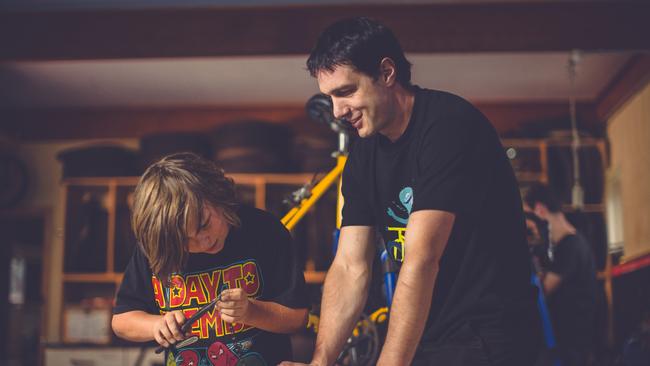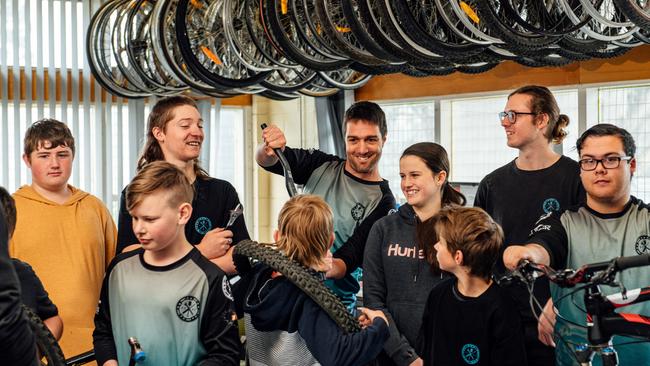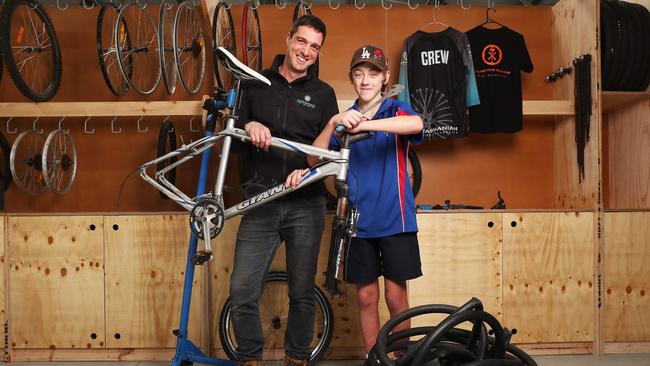Tasmanian Bike Collective chief on how best to stamp out state’s youth crime
Following a wave of youth crime in the state’s south, the Tasmanian Bike Collective chief believes locking them up doesn’t work. He says he has seen first hand what does.

Tasmania
Don't miss out on the headlines from Tasmania. Followed categories will be added to My News.
The head of a Tasmanian organisation that mentors and trains young people says locking up youths does not reduce crime and “often exacerbates the problem”.
Ant Edler, the CEO of the Tasmanian Bike Collective, said a Queensland Family and Child Commission report revealed that up to 96 per cent of young offenders reoffended within 12 months of release, with high rates of recidivism across all detention centres.
“Despite youth detention being the most expensive option, politicians continually call on tougher sentencing laws to address youth crime,” he said.
Mr Edler, who set up the collective 20 years ago after seeing students “struggle and become disconnected” has spoken up in the wake of a spate of youth crime and the government’s move to consider adult penalties for young offenders.

He says while some young people still “slip through the cracks” he has “hundreds of positive stories” about students who have turned their lives around in programs run with nine schools at Risdon Vale, the Huon Valley and Clarence Plains.
“Currently, the Tasmanian Bike Collective works with over 80 young people every week who are beginning to, or already are disengaged from education — this is one of the earliest indicators of future antisocial behaviour,” Mr Edler said.
“Research indicates that school disengagement erodes important social bonds and prosocial environments and contributes to increased risk of antisocial behaviour.
“Further investment to empower and re-direct young people when these early indicators appear is critical.”
Mr Edler said the state government’s own Youth Justice Blueprint 2024–2034 emphasised the importance of restorative, not punitive, measures.
“We want to become state-wide, we want to work in more communities but we’re hindered just by that (lack of) funding,” he said.
“Rather than resorting to detention, we urge the government to invest in providing young people with the opportunities and support needed from a young age to become positive contributors to our community.

“We acknowledge that investing in preventative programs will not solve the immediate challenges our community is facing with youth crime, and we want to be clear that we do not condone the anti-social or criminal behaviour being displayed.
“However, it is precisely because of decades of underinvestment in preventative and restorative measures that we find ourselves in this situation today.
“If we are to truly break this cycle, we must shift our focus from reactive responses to proactive solutions that support young people before they reach crisis point.”
A government spokesperson said the government invested in a range of programs including JCP Youth’s Beast Program, the Tasmanian Bike Collective and the Back on Track team working with disengaged youth.
“Under our Youth Justice Blueprint, we are investing more than $15m in early intervention and diversion for young people,” she said.
“When communities are concerned about their safety, as a government we must act.
“We will continue to support police, invest in programs for young people and take action to address the causes of youth crime in Tasmania.”



